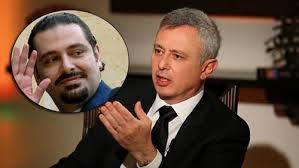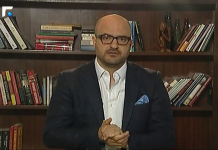Down and out in Beirut
Michael Young/Now Lebanon/March 31/16
The former prime minister, Saad Hariri, must be wondering what he did wrong. The latest reason for his disbelief came because of an interview given this week by the Saudi ambassador in Lebanon, Ali Awad al-Assiri, to Al-Araby al-Jadeed.
In remarks to the newspaper, Assiri was quoted as saying that Saudi Arabia did not intend to intervene in the Lebanese presidential election, but supported any candidate whom the Lebanese chose. He then added that the Kingdom had not backed Sleiman Franjieh, but rather had supported an initiative around which it thought there was a consensus. However, the ambassador added, “we did not see this consensus.”
Hariri is the main backer of a Franjieh presidency, and at the time Assiri’s comments were made he was traveling to Moscow to gauge Russian intentions toward the election. That’s why the ambassador’s comments were, effectively, a disavowal of the former prime minister’s position, and at a particularly sensitive moment.
Perhaps sensing the Saudi mood, or because of the rapprochement between Michel Aoun and Samir Geagea, another major backer of Franjieh’s candidacy now apparently has second thoughts about supporting him. Walid Jumblatt is not hiding the fact that today he is less than committed to Franjieh.
It could be that Jumblatt does not want to find himself on the wrong side of a unified Maronite community, with all the repercussions this might have in the mountains. Or it could mean, simply, that he has understood that the Franjieh moment is now gone. Whatever the reason, these developments mean that Hariri is effectively on his own in favoring the Zgharta politician, with no signs his strategy will come to fruition.
In Hariri’s calculation, a Franjieh victory, made possible through his support, served one main purpose: it would mean that Hariri himself could return as prime minister. It appears that he sees this as a lifeline, at a time when the Kingdom has not only failed to help him financially, but also when its approach to him and the Sunni community in general has changed. The Saudis no longer wish to deal with Hariri as their main interlocutor in Lebanon, but have pushed the former prime minister to open up to other Sunni leaders in the country, many of whom were previously his political rivals. This includes the likes of Abdel Rahim Mrad and Najib Mikati.
If Hariri were to become prime minister, the situation would change in the view of the Hariri camp. The Saudis would have no choice but to bolster Hariri financially, since they could not afford to undermine their ally in Beirut. But also, politically, he would be in a better position to marginalize other Sunni politicians, since he would again emerge, by virtue of his status and popular support, as the leading Sunni figure in the state.
The problem is that Hezbollah has other thoughts when it comes to Hariri. Their problem was never with Franjieh, it was with the fact that the Franjieh presidential project was initially sponsored by Hariri and Jumblatt. The party does not want Hariri to return as prime minister, since he would be in a position to unify the Sunnis and potentially galvanize the community.
But does that mean that Aoun’s chances are rising? Here, Hezbollah is in something of a dilemma. If Hariri were to switch his support to Aoun, in that way becoming a kingmaker, Hezbollah would be unable to hinder his election, as it did after Geagea’s endorsement of the general. The reason is that the Hariri bloc, along with the Aounist and Lebanese Forces blocs, would have an absolute majority in a second round of voting. That essentially would mean that Jumblatt, not wanting to be isolated, would go along with Aoun too, while Hezbollah could not avoid supporting the general, and would have no option but to push Nabih Berri to do so as well, in the name of national unity.
But might Hariri really gravitate toward Aoun? At a time when the Saudis are focused on opposing Hezbollah and consider the general a peon of the party this seems very unlikely. Hariri is in an impossible situation: the Saudis are cutting him no slack, Hezbollah is blocking his return to the premiership, Franjieh, if he ever becomes president will do so under conditions set by Hezbollah, and the former prime minister has lost his main Christian ally and cannot really trust Jumblatt. It has been a difficult return to Lebanon for Hariri, who must be little reassured the future will bring better.
**Michael Young is a writer and editor in Beirut. He tweets @BeirutCalling.




















